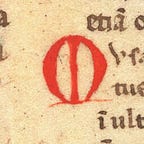Vermont Italian Herbal — Luccia Maggiore
University of Vermont MS 2 is an illustrated herbal written in Pistoia (Tuscany) in the second half of the XV Century.
This post provides a list of the plants illustrated in the manuscript. Several of the plants appear to be derived from the textual and visual tradition of the “Alchemical Herbal”, whose earliest surviving exemplar is Bodley MS. Canon. Misc. 408, Milan, 1378. This is the case for Herba Luccia Maggiore, a clearly fantastic plant, with blue eyes on its leaves and a fish-like zoomorphic root. In Italian, “luccio” means “pike-fish” and “luce” means “light” — the description and the illustration of the plant were clearly based on these associations. Another variant of Luccia from the same herbal was discussed here.
Transcription: Erba luccia maggiore e questa erba e sono disette ragioni derba luccia Questa e la maggiore / e decto pesceterra questa e la piu nominata Questa erba nasce in luoghi alpestri et in uallj / et per i prati humidi egrassi efa sette fogle et fafiori rossi eseme rosso eochi azurri Et / luce dinocte Epastori dellalpe lauegghono di nocte ha molte virtu tralequali / ognj ferita fresca inquattro hore salda. Etquando uscisse sangue troppo abondantemente poni / suso ladecta erba lo ristrigne. Et sangue che esce dallaparte dentro daglele bere subito guarira / Allochio che habbia magia o macula o scama pesta la decta erba epolla suso nellochio eguarra / subito per una nocte rode erischiara lochio elamagla leua uia interamente elaluce rimane / chiara . vale almale caduco atenerla adosso che tanto che laterra adosso mai gli uerra / tale male. Caua ogni corruption esangue corropto Et lerba a sapore di sepo Et pugne / unpocho la lingua fa l’uomo gratioso et essere amato a tenerla adosso. Et vale contro / animici che gli riconcilia. Et ha molte altre virtu assai Vuolsi corre di giugno ad .xv. / della luna.
Translation: This plant is the major Luccia plant and there are seven kinds of Luccia. This is the greatest one; / it is called earth-fish and it is the most famous [of the seven]. This plant grows in the mountains and in valleys / and in wet and rich meadows. It makes seven leaves and it makes red flowers and red seeds and blue eyes. / It shines at night; the shepherds see it at night in the mountains. It has many virtues, among which: it heals / any fresh wound in four hours. If one is losing blood too quickly, place / this plant [upon the wound] and it stops. If blood is coming from inside, give it to drink and [the patient] will immediately be healed. / If an eye has a spot, cataract or gunk, crush this plant and put it upon the eye and it will immediately be / healed; it brushes and cleans the eye for a whole night, it completely removes the spot and sight remains / clear. It is helpful against epilepsy, if one wears it; as long as one wears it, he will not be stricken by / that illness. It removes any corruption and corrupted blood. The plant tastes like grease and it is / somehow pungent upon the tongue. It makes a man graceful and if one wears it he will be loved. It is helpful against enemies / because it reconciles them. It has many other virtues. It must be picked in June in the 15th day / of the moon.
